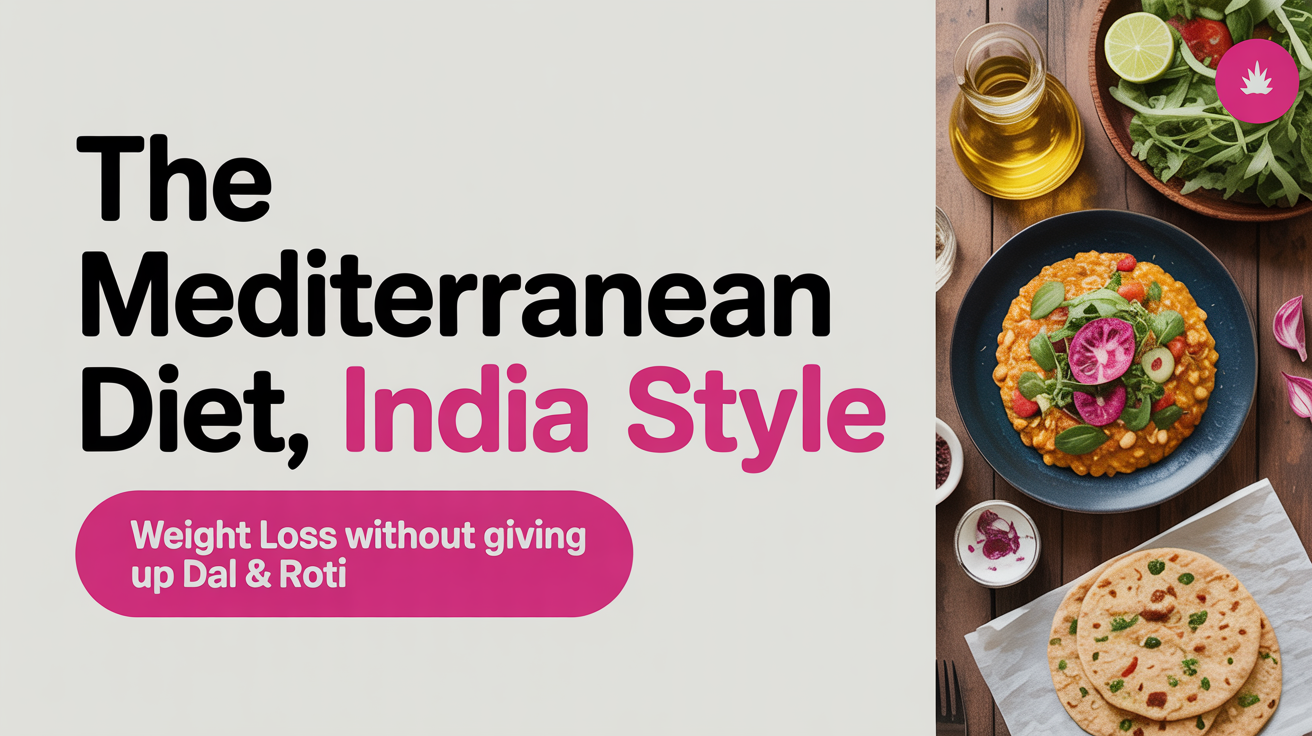The Mediterranean diet is often praised as one of the healthiest eating patterns in the world. It is linked to weight loss, improved heart health, better digestion, and even longer life expectancy. But for many Indians, it feels unrealistic. How can we follow a diet filled with olive oil, salads, and grilled fish when our comfort lies in dal, roti, sabzi, and aromatic spices?
The good news is that you can follow a Mediterranean-inspired diet without giving up Indian staples. By making smart swaps and focusing on fresh, whole foods, you can combine the science-backed benefits of the Mediterranean way with the warmth of Indian cuisine.
What is the Mediterranean Diet?
The Mediterranean diet is based on the traditional eating habits of countries like Greece, Italy, and Spain. It focuses on:
- Plenty of fresh vegetables and fruits
- Whole grains instead of refined carbs
- Legumes like lentils and chickpeas
- Healthy fats from olive oil, nuts, and seeds
- Lean proteins like fish, eggs, and poultry
- Limited red meat and processed foods
It is less about strict rules and more about a lifestyle that prioritizes fresh, unprocessed food.
Why the Mediterranean Diet Works for Weight Loss
The diet naturally reduces empty calories, increases nutrient density, and helps regulate blood sugar. For Indians over 30, it can help:
- Manage cholesterol levels
- Improve digestion and gut health
- Reduce belly fat and water retention
- Support heart health
Adapting the Mediterranean Diet to the Indian Kitchen
You do not need to replace dal with hummus or roti with pita bread. Instead, you can:
1. Use Healthy Oils
Swap refined vegetable oils for cold-pressed mustard oil, groundnut oil, or extra virgin olive oil in moderation.
2. Eat More Seasonal Vegetables
Just like the Mediterranean diet encourages colorful produce, you can fill your plate with Indian vegetables like lauki, bhindi, spinach, and carrots.
3. Increase Legumes
Our dals — masoor, moong, chana — already align perfectly with the Mediterranean focus on plant-based proteins.
4. Add Healthy Fats
Incorporate almonds, walnuts, flaxseeds, and sesame seeds into your meals.
5. Choose Whole Grains
Opt for whole wheat roti, jowar, bajra, or brown rice instead of refined flour or polished white rice.
Sample Indian-Mediterranean Diet Plan for Weight Loss
Breakfast:
- Moong dal chilla with mint chutney
- Fresh fruit bowl with pomegranate and papaya
Mid-Morning Snack:
- Handful of soaked almonds and walnuts
Lunch:
- Brown rice with rajma curry
- Stir-fried spinach and beans with olive oil drizzle
Evening Snack:
- Masala roasted chana or hummus with carrot sticks
Dinner:
- Whole wheat roti
- Grilled fish or paneer tikka with salad
For more such plans, check our weight loss and weight gain diet programs.
Benefits of the Indian-Style Mediterranean Diet
1. Sustainable Weight Loss
By focusing on fiber, protein, and healthy fats, it prevents overeating.
2. Better Heart Health
Healthy oils, nuts, and omega-3-rich foods protect the heart.
3. Improved Digestion
The high fiber intake supports gut health and prevents constipation.
4. Hormone Balance
Nutrient-dense foods stabilize hormones, especially for women over 35.
Indian Foods That Fit Perfectly in the Mediterranean Diet
- Dal & Lentils: Masoor dal, moong dal, chana dal
- Whole Grains: Roti from whole wheat, jowar, bajra
- Vegetables: All seasonal Indian veggies
- Healthy Fats: Nuts, seeds, coconut, olive oil
- Proteins: Paneer, fish, chicken, eggs
Frequently Asked Questions
Q1: Can vegetarians follow the Mediterranean diet?
Absolutely. Lentils, chickpeas, paneer, and nuts provide enough protein.
Q2: Is olive oil necessary?
Not strictly. You can use cold-pressed Indian oils like mustard or groundnut oil.
Q3: How many rotis can I eat on this diet?
This depends on your activity level, but 2–3 whole wheat rotis per day can fit in.
Q4: Can I still have Indian desserts?
Occasionally, yes. Opt for natural sweeteners like jaggery and keep portions small.
Simple Mediterranean-Style Indian Recipe
Olive Oil Tadka Dal
- Cook masoor dal with turmeric and salt
- Prepare tadka with olive oil, garlic, cumin, and red chili
- Pour over dal and serve with brown rice or roti
Conclusion
The Mediterranean diet is not about eating foreign food. It is about embracing fresh, whole ingredients and healthy cooking methods — something Indian cuisine already excels at. By blending the two, you can enjoy the health benefits without giving up your favorite dal and roti.

